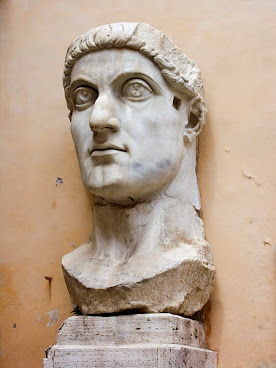THE HISTORY of the ANCIENT WORLD: FROM the EARLIEST ACCOUNTS to the FALL of ROME by Susan Wise Bauer
Published by W. W. Norton in 2007
Susan Wise Bauer is well-known in the home school community for her well-written histories. I am not a home school parent but I do recommend her History of the Ancient Word for history buffs who would like a long-term general overview of history.
Bauer mines lots of types of sources to build a view of the earliest cities and their beliefs. Bauer's history focuses on political leaders and religious/philosophical beliefs of different civilizations. One thing that I really like was her ability to take myths and legends (like Gilgamesh) and tie them into actual history and demonstrate why those myths and legends mattered to those ancient peoples and give the modern reader a way to have a better understanding of these ancient peoples.
The book starts with a focus on four major civilizations: Mesopotamia, Egypt, the Indus River Valley (India) and the Yellow River Valley (China). As these groups grow, other areas are added (such as Ancient Greece and Rome).
The text of this book is 777 pages long and it has almost 90 pages of works cited, notes and an index. One of the real strengths of this book is the inclusion of nearly 100 relevant maps. I was also pleased with the timeline included at the end of every chapter was helpful as well. Each timeline included the civilization just discussed and another of the groups as well so they can be compared.
For all of the strengths, the book does have weaknesses. It rarely discusses technological changes or different agricultural techniques. The book focuses on leaders, wars and battles, the common man of the past is rarely spoken of. To be fair, this book is a chunk as it is - if more detail were included it would be an unwieldy tome.
Bauer does delve into philosophical movements, as I mentioned earlier, but, surprisingly, leaves out the entirety of the philosophical movement of Ancient Greece except to quote them when talking about other cultures. Socrates, Plato, Pythagoras, Aristotle, the Stoics - their ideas are not discussed at all. I found that to be so odd that I literally searched the book's index to see if I had just skipped the chapter they are in. Along with Judeo-Christian beliefs, Greek thought was (and is) one of the pillars of Western thought.
The book does not actually go to the Fall of Rome, which has been traditionally dated at 476 AD. Instead, it ends at 312 AD when Constantine the Great became the sole Roman Emperor (prior to that he was a co-ruler). That is an interesting date to choose because that is the moment when Christianity stopped being a persecuted religion in the Roman Empire.
NOTE: This book is the first in a multi-part series that is still being published.
I rate this book 4 stars out of 5. It can be found on Amazon.com here: The History of the Ancient World: From the Earliest Accounts to the Fall of Rome.
Susan Wise Bauer is well-known in the home school community for her well-written histories. I am not a home school parent but I do recommend her History of the Ancient Word for history buffs who would like a long-term general overview of history.
Bauer mines lots of types of sources to build a view of the earliest cities and their beliefs. Bauer's history focuses on political leaders and religious/philosophical beliefs of different civilizations. One thing that I really like was her ability to take myths and legends (like Gilgamesh) and tie them into actual history and demonstrate why those myths and legends mattered to those ancient peoples and give the modern reader a way to have a better understanding of these ancient peoples.
The book starts with a focus on four major civilizations: Mesopotamia, Egypt, the Indus River Valley (India) and the Yellow River Valley (China). As these groups grow, other areas are added (such as Ancient Greece and Rome).
The text of this book is 777 pages long and it has almost 90 pages of works cited, notes and an index. One of the real strengths of this book is the inclusion of nearly 100 relevant maps. I was also pleased with the timeline included at the end of every chapter was helpful as well. Each timeline included the civilization just discussed and another of the groups as well so they can be compared.
For all of the strengths, the book does have weaknesses. It rarely discusses technological changes or different agricultural techniques. The book focuses on leaders, wars and battles, the common man of the past is rarely spoken of. To be fair, this book is a chunk as it is - if more detail were included it would be an unwieldy tome.
 |
| Constantine the Great (272-337). Photo by Jean-Christophe BENOIST |
Bauer does delve into philosophical movements, as I mentioned earlier, but, surprisingly, leaves out the entirety of the philosophical movement of Ancient Greece except to quote them when talking about other cultures. Socrates, Plato, Pythagoras, Aristotle, the Stoics - their ideas are not discussed at all. I found that to be so odd that I literally searched the book's index to see if I had just skipped the chapter they are in. Along with Judeo-Christian beliefs, Greek thought was (and is) one of the pillars of Western thought.
The book does not actually go to the Fall of Rome, which has been traditionally dated at 476 AD. Instead, it ends at 312 AD when Constantine the Great became the sole Roman Emperor (prior to that he was a co-ruler). That is an interesting date to choose because that is the moment when Christianity stopped being a persecuted religion in the Roman Empire.
NOTE: This book is the first in a multi-part series that is still being published.
I rate this book 4 stars out of 5. It can be found on Amazon.com here: The History of the Ancient World: From the Earliest Accounts to the Fall of Rome.











Comments
Post a Comment